Politics
About Andrew Cusack
 Writer, web designer, etc.; born in New York; educated in Argentina, Scotland, and South Africa; now based in London.
Writer, web designer, etc.; born in New York; educated in Argentina, Scotland, and South Africa; now based in London. read more
News
Blogs
Reviews & Periodicals
Arts & Design
World
France
Mitteleuropa
Knickerbockers
Argentina
The Levant
Africa
Cape of Good Hope
Netherlands
Scandinavia
Québec
India
Muscovy
Germany
Academica
Regnum, Ecclesia, Studium
The threefold division of the world
As such he might be expected to have ideas about the idea of a university, and he wrote about them in The Spectator in August 1983.
Mister Grimond (as he still was then, only just), suggested those interested in the subject “might turn to a lecture by Ronald Cant, sometime Reader in Scottish History in the University of St Andrews”:
[…]
A vital aspect of this tripartite organisation, as Cant says, was that each should serve and support the other. But the studium, while interacting with the regnum and ecclesia, must maintain its independence.
It was certainly the business of the studium to advance knowledge, but that was not to be the end of the matter. Knowledge was linked to public service. The learned man had a duty to the community as well as a right to pursue his intellectual quarry. In fact he pursued the quarry on behalf of the community.
The tripartite division of the world, although old-fashioned, seems to me a useful concept, emphasising that government, morality, and higher education are separate but intertwined.
It seems to me that if we expel the regnum and the ecclesia utterly from the world of the university we shall end up paradoxically with universities totally dependent upon the state… but as subservient as those in Rome.
The liberal spirit gave birth and sustenance to universities; if its progeny does not foster it in the regnum they may indeed end up as purely vocational colleges.
Gaullist California
A friend well conversant in my ongoing crusade to remind today’s centre-droit of the utility of the Gaullist experience writes in:
The Golden State once practised a very successful form of Cal-Gaullism, developing world-class infrastructure, research universities, new industries… and much of the place was solidly conservative.
Once upon a time, parts of Southern California (including Orange County) were deemed the most conservative places in America, from which Nixon, Reagan, and others sprang.
San Francisco, though still beautiful, is certainly now well past its prime; I remember that white tie and tails were still seen there regularly as late as the ’80s.
The Polish church in Los Angeles was built to serve the large number of Polish exile families (with fathers who were aerospace engineers trained in the RAF like mine) who came from the UK and Canada to work in what was then the world centre of the aerospace and defence industry — “the Gunbelt in the Sunbelt”.
Weiter vorwärts
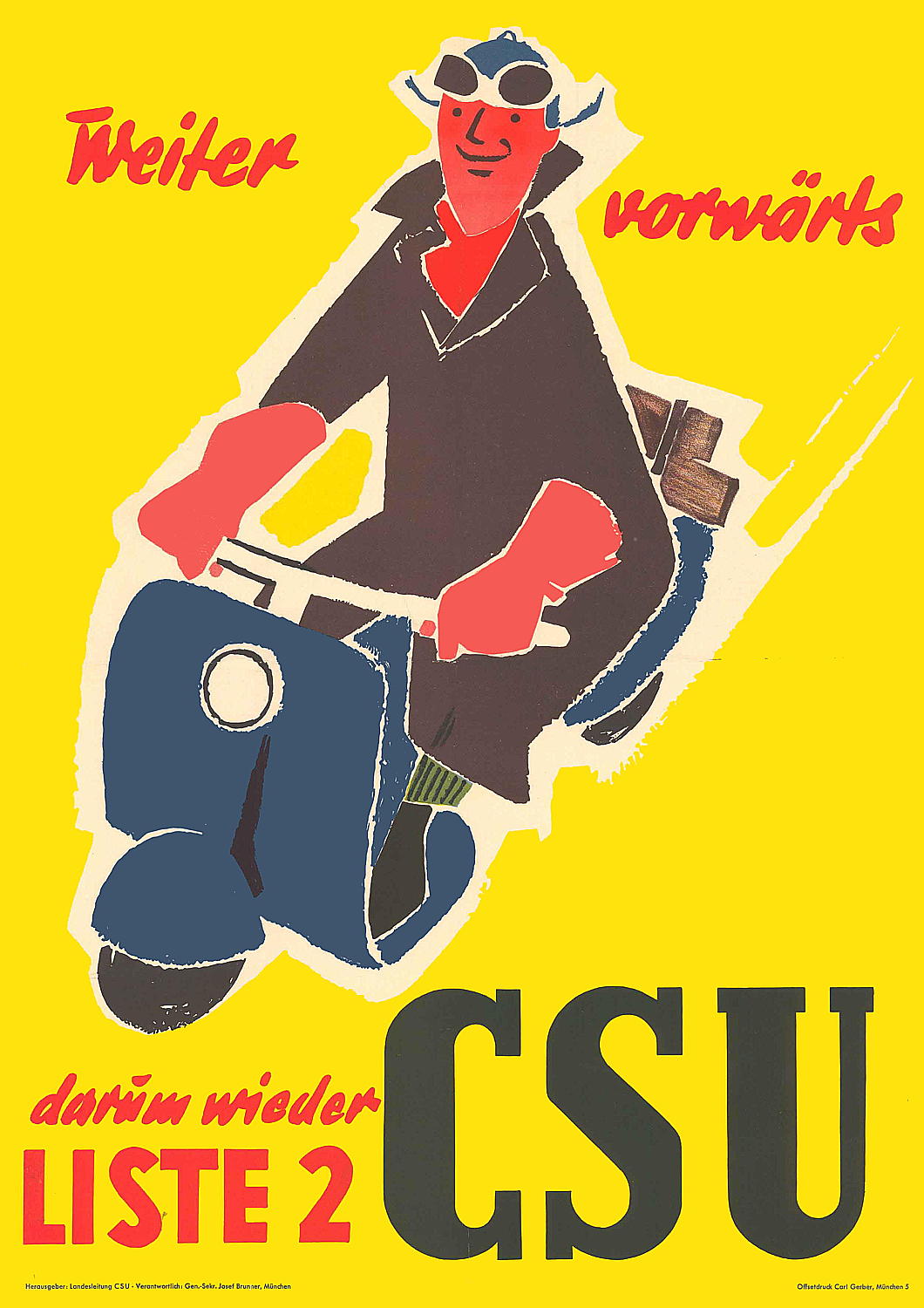
The Situation in the Far East
A century-old geopolitical cartoon is updated for today
Tse Tsan-tai — or 謝纘泰 if you fancy — was by any standard a remarkable man. Born in New South Wales, this Chinese-Australian Christian was a colonial bureaucrat, nationalist revolutionary, constitutional monarchist, pioneer of airship theory, and co-founded the South China Morning Post — still one of the most prominent newspapers in the Orient.
Tse’s most important visual contribution was a widely distributed political cartoon usually known in English as ‘The Situation in the Far East’ or in Chinese as the ‘Picture of Current Times’ (below).
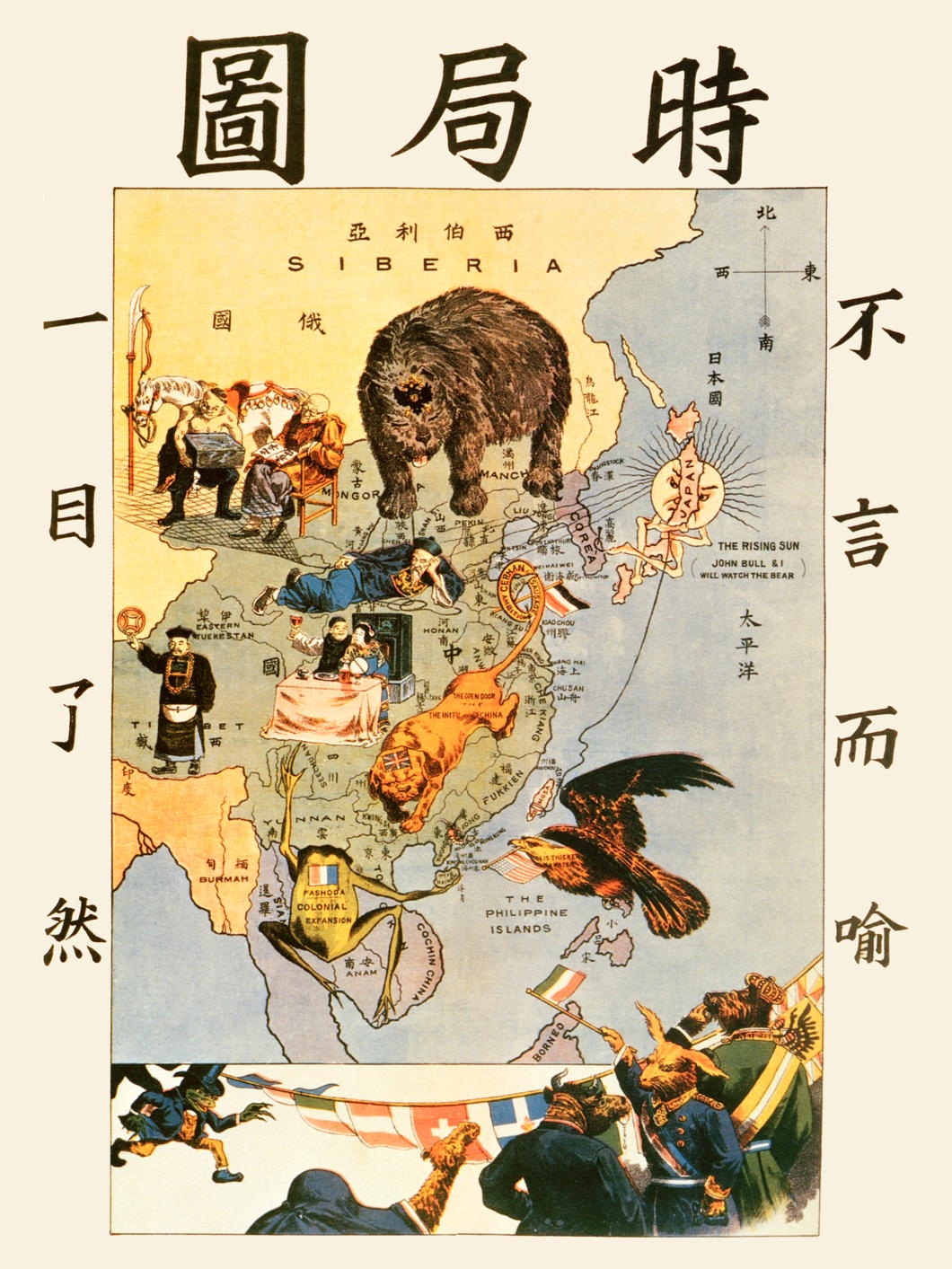
Crafted as a propaganda measure to warn his fellow Chinese of the designs of foreign powers, the cartoon depicts the perils facing the Middle Kingdom.
Japan, with its expanding navy, proclaims it will watch the seas with its ally, Great Britain. The Russian bear looms from Siberia, crossing the border into China. A British lion sprawls over the land, its tail tied up by the “German Sausage Ambitions” at Tsingtao. The French frog guards Indochina while the American eagle lurks from the Philippines.
Meanwhile, the Chinese figures show sleeping bureaucrats and carousing intelligentsia unresponsive to the external threats.
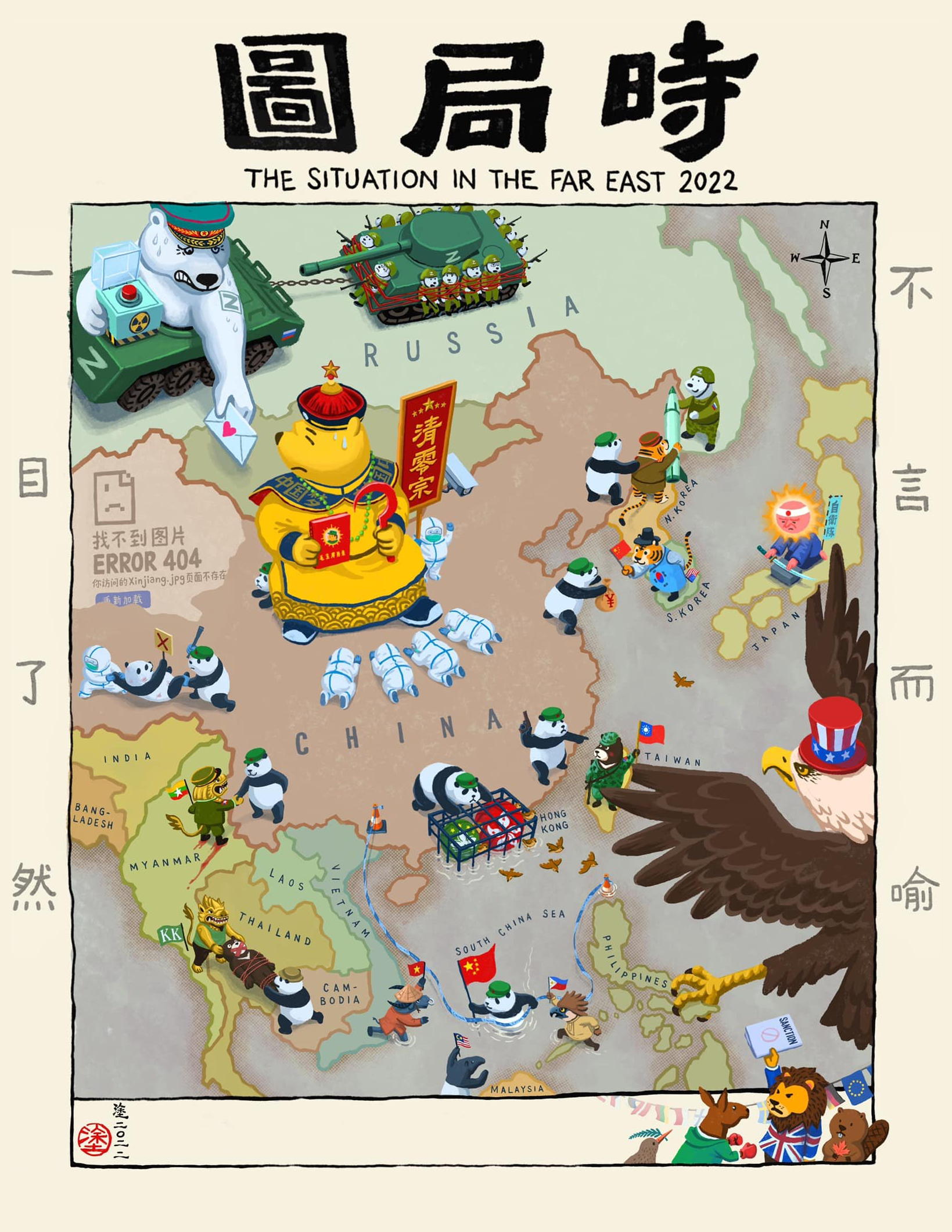
Now the exiled Hong Kong artist Ah To (阿塗) has updated ‘Situation’ to reflect the realities of 2022. (more…)
The Accident of Birth
A king is a king, not because he is rich and powerful, not because he is a successful politician, not because he belongs to a particular creed or to a national group. He is king because he is born.
And in choosing to leave the selection of their head of state to this most common denominator in the world — the accident of birth — Canadians implicitly proclaim their faith in human equality, their hope for the triumph of nature over political manoeuvre, over social and financial interest; for the victory of the human person.
— Fr Jacques Monet SJ FRSC
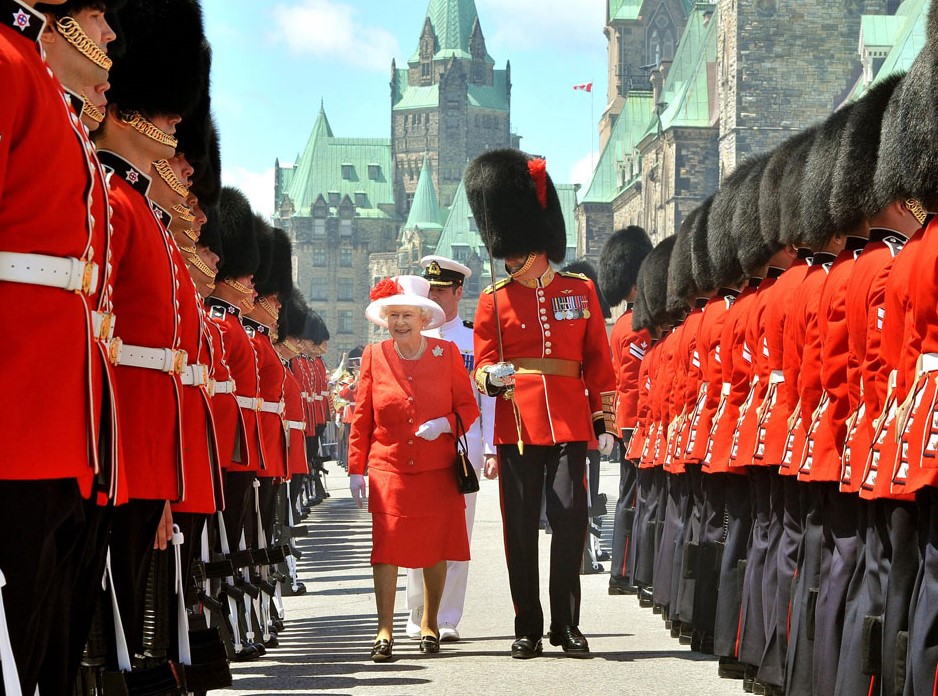
Anglo-Gaullist Reading Update
The latest round of news or commentary of Gaullist content or interest:
Mercator: Charles de Gaulle: a wise ruler of France
Financial Times: France invokes the golden age of de Gaulle
Politico: Why all French politicians are Gaullists
Variety: Cliché-Ridden ‘De Gaulle’ is Unworthy of Its Iconic Subject
Fifth Republic Britain
An Anglo-Gaullist Reading Round-up
While I’m a big Adenauer fan there’s little doubt that de Gaulle was the greatest European statesman of the twentieth century and an historical figure of such a position will always be the subject of interest.
Both Jonathan Fenby’s 2010 book The General: Charles de Gaulle and the France He Saved and Dr Sudhir Hazareesingh’s 2012 In the Shadow of the General: Modern France and the Myth of de Gaulle received wide notice, but neither as much as Julian Jackson’s 2019 A Certain Idea of France: The Life of Charles de Gaulle.
Jackson’s work is indeed magisterial and Lord Sumption’s praise of it as “the best biography of de Gaulle in any language” is only just an exaggeration. (For a strong bibliography of works on the general, see the appendix of Charles Williams’s 1993 The Last Great Frenchman: A Life of General de Gaulle.)
Study of the life and contradictions of de Gaulle is always worthwhile, but many spy a Gaullist moment in the Tory party’s refreshingly surprising turn away from ideological liberalism towards a more pragmatic conservatism under Boris Johnson.
Painting Johnson as Britain’s first Gaullist prime minister would be a stretch, but there is certainly some crossover: nationalist, economically interventionist, focused on national sovereignty and national exceptionalism.
■ Eliot Wilson pointed out this summer that Boris has always been difficult to classify in ideological terms.
■ Speccie political editor James Forsyth wrote in The Times that Boris the Gaullist puts action over ideas. Just before the party conference Forsyth also predicted the PM’s speech would be “in line with his recent Gaullist turn”.
■ QMUL’s Nick Barlow explores the parallels between de Gaulle’s Fifth Republic and Boris’s style of government.
■ Meanwhile Aris Roussinos argues that de Gaulle was always right in vetoing British entry into the EEC, and that true-blue FBPE types should welcome Brexit as advancing the cause of European integration.
■ Dean Godson (New Statesman) says that Defence Secretary Ben Wallace is pursuing “almost Gaullist trajectory for future British policy”.
■ When asked (on GB News) where he sits on the political spectrum, national treasure Peter Hitchens expressed his surprise that the Gaullist combination of “strong defence, patriotism, a strong welfare state, and national independence” isn’t more common in British politics.
■ ‘Bagehot’, the political column in The Economist, put it that the man who rebuilt post-war France has some important lessons for Britain’s prime minister: What Boris could learn from de Gaulle.
■ The American Conservative embarrassingly illustrated a piece on Europe’s Gaullist Revival with a picture of General Kœnig. (Always check the képi — as a brigadier general, de Gaulle only had two stars!)
■ Mike Bird discerned some Anglo-Gaullism in a pile of recent newspaper headlines.
■ As long ago as 2017 — what a world away that was! — Prospect argued in a somewhat rambling piece that the Brexiteers were Britain’s new Gaullists.
■ Honourable mention: Frederick Studemann chides Churchill and dumps de Gaulle, saying Boris should model himself on Bismarck and make for a Prussian Brexit.
But, for all this, when New Labour bigwig John McTernan suggested that Boris is not a Churchill but a de Gaulle, the great Julian Jackson himself pointed out there are still great differences between the PM and le général.
All the same, I’m welcoming our Anglo-Gaullist future with open arms.
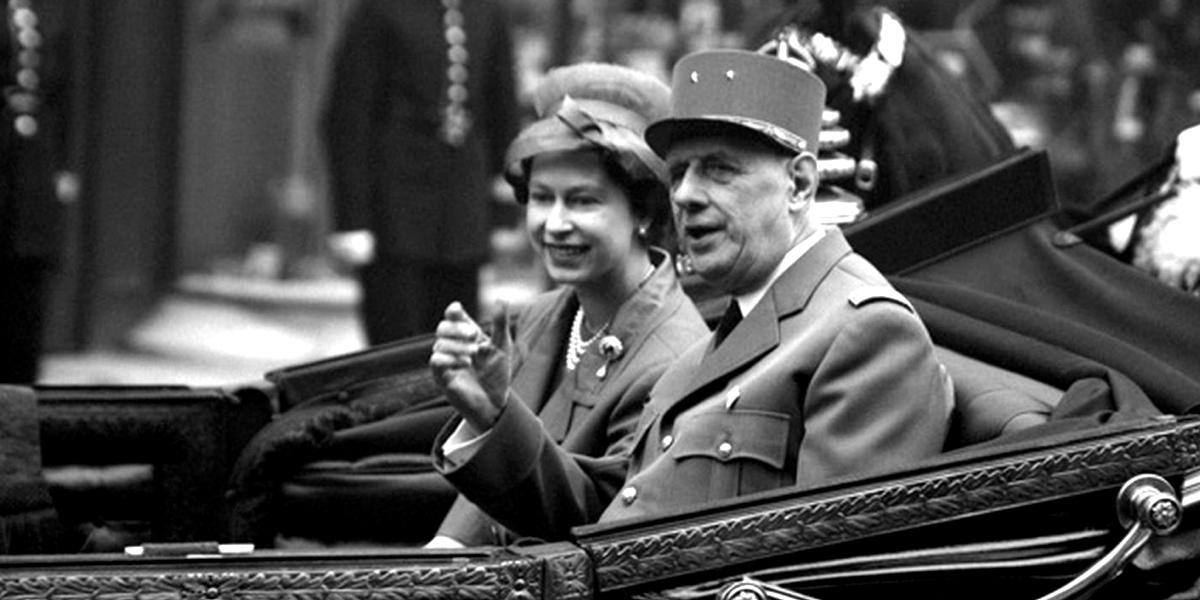
Articles of Note: 15.I.2021

• Autumn and winter are a time for ghouls and ghosts and eery tales. At Boodle’s for dinner two or three years ago I sat next to the wife of a friend and exchanged favourite writers. I gave her the ‘Transylvanian Tolstoy’ Miklos Banffy, in exchange for which she introduced me to the English writer M.R. James — whose work I’ve immensely enjoyed diving into. The inestimable Niall Gooch writes about Christmas, Ghosts, and M.R. James, as well as pointing to Aris Roussinos on how Britons’ love for ghostly tales is a sign of (little-c) conservatism.
• There can be few figures in English history more ridiculous than Sir Oswald Mosley. But the Conservative MP who became a Labour government minister and then British fascist führer-in-waiting was also forceful in his condemnation of the savagery unleashed by the Black-and-Tans. In 1952 a local newspaper in Ireland announced that Sir Oswald and Lady Mosley “charmed with Ireland, its people, the tempo of its life, and its scenery” had taken up residence at Clonfert Palace in Co. Galway. “Sir Oswald,” the paper noted with amazing restraint, “was the former leader of a political movement in England.” Maurice Walsh presents us with the history of Mosley in Ireland.
• The death of the late Lord Sacks, Britain’s former Chief Rabbi, was the subject of much lament. Rabbi Sacks was obviously no Catholic, but his intellect, frankness, and generosity were much appreciated by Christians. Sohrab Ahmari, one of the editors at New York’s most ancient and venerable daily newspaper, offers a Catholic tribute to Jonathan Sacks.
• “Education, Education, Education” has become a mantra in the past quarter-century and while there is a point there’s also a certain error of mistaking the means to an end for the end itself. After all, in the 1930s Germany was the most and highest educated country in the world. At Tablet, probably America’s best Jewish magazine, Ashley K. Fernandes explores why so many doctors became Nazis.
• Fifty years ago the great people of the state of New York rejected both the Republican incumbent and a Democratic challenger to elect the third-party Conservative candidate James Buckley as the Empire State’s senator in Washington. At National Review Jack Fowler tells the gleeful story of the unique circumstances that brought about this victory for Knickerbocker Toryism and how Mr Buckley went to the Senate.
CDU @ 75
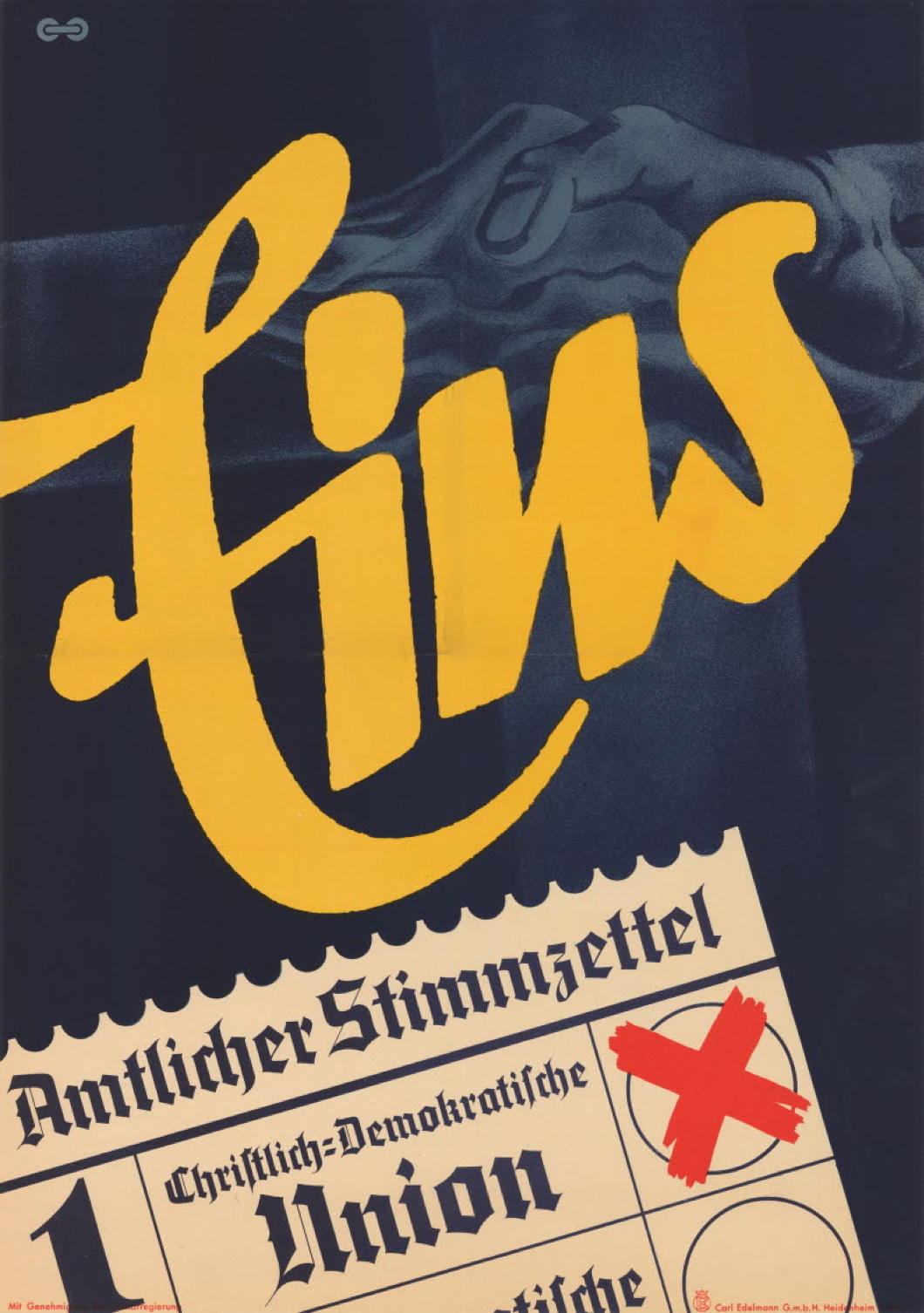
Last week was the seventy-fifth anniversary of the foundation of Germany’s Christian Democratic Union, one of the most successful democratic political parties in postwar Europe.
Indeed, under Adenauer the CDU was one of the institutions which transformed relations between the peoples of Europe and started the process of integration which, alas, has not aged well.
Nonetheless, here are some election posters from the early years of the CDU — plus one from the 1980s. (more…)
The politics of parliamentary colour
When Quebec’s « Salon bleu » was the « Salon vert »
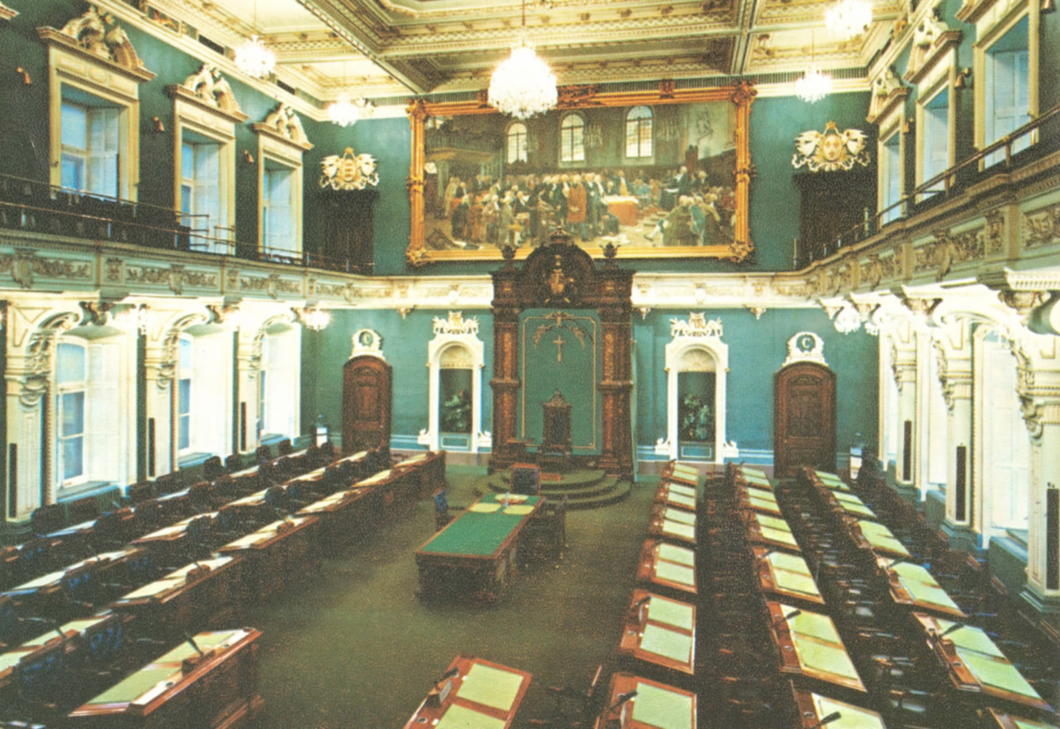
One Westminster tradition replicated in many times and places across the Commonwealth is a convention of colour: the lower house of a parliament is decorated in green, while the upper chamber is decorated in red. This reflects the green benches of the House of Commons and the red ones of the House of Lords.
Officially the plenary chamber of Quebec’s unicameral parliament is boringly the salle de l’Assemblée nationale but because of the colour of its walls it is more often known as the Salon bleu. One’s never surprised when Quebec bucks a trend or (more specifically) rejects an Anglo convention but it turns out the province’s plenary chamber did in fact used to be green until relatively recently.
When the members of the Legislative Assembly (as it then was) first convened in the Hôtel du Parlement in 1886 the walls were actually white. By the opening of the 1895 session the desks had been reappointed in green, but Le Soleil still made reference to the room as the “chambre blanche”. It was only in 1901 that the room was painted a “soft green” and the carpets and other furnishings changed accordingly. It even made an appearance in Alfred Hitchcock’s 1953 film “I Confess”.
From then the chamber was a Salon vert until 1978, when the decision was taken to begin broadcasting the proceedings of the Assemblée nationale.
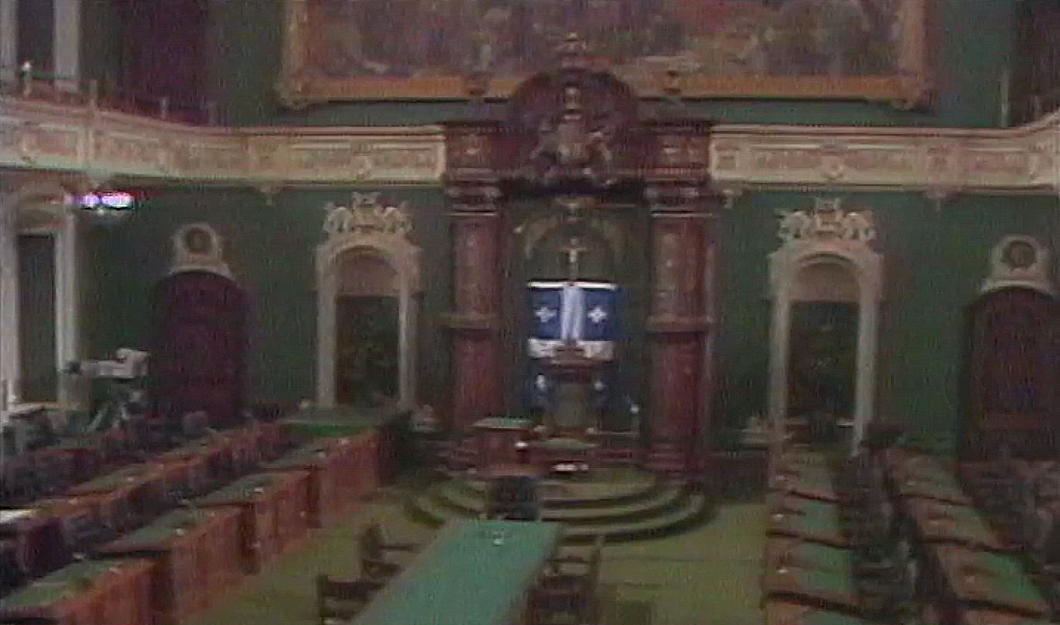
The television specialists complained that the dark green of the chamber was not visually conducive to the TV cameras available at the time and, looking at the evidence from the 1977 test session (above), one can see their point. Walls of either beige or blue were the options recommended in an official report, and unsurprisingly the national colour was chosen.
The historian Gaston Deschênes has mentioned the technical requirements of broadcasting also coincided with a desire to break with a “British” tradition. Certainly the government of the day, René Lévesque’s Parti Québécois, didn’t mind the change, while Maurice Bellemare — “the old lion of Quebec politics” and sometime leader of the old Union nationale — was deeply pleased that the chamber adopted the colour of Quebec’s flag.
So the walls were repainted sky blue and the furnishings changed accordingly, resulting in the Salon bleu we know today (below).
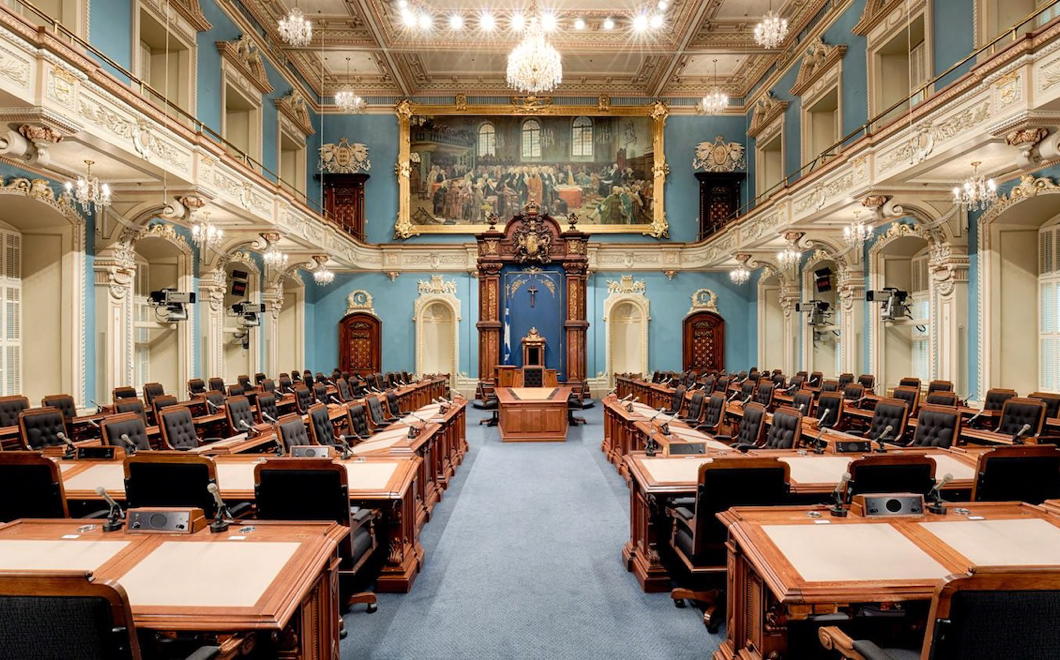
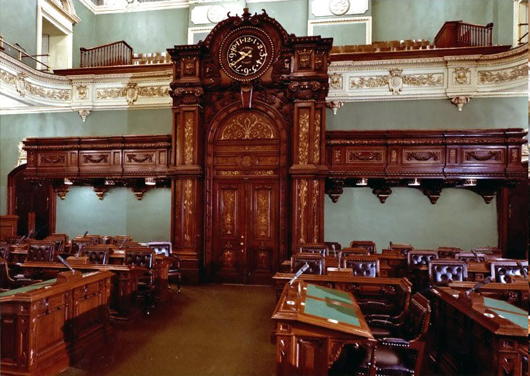
A tweet from the Assemblée’s official account shows two photos looking towards the chamber’s entrance from before (above) and after (below) it was made ready for television.
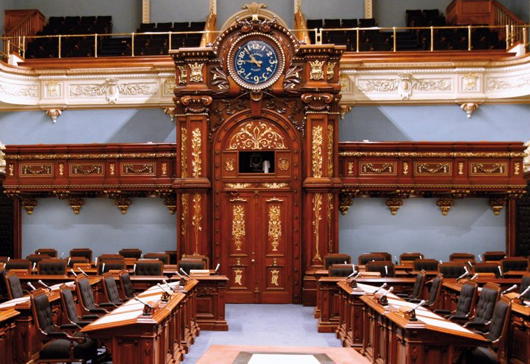
All the same, green is not universal amongst Commonwealth lower (or only) chambers. It’s not even universal in Canada: Manitoba joins Quebec in its azure tones while British Columbia’s is red-dominated.
Quebec was the last of Canada’s provinces to abolish its upper house, the Legislative Council, in 1968 (at the same time the lower house was renamed the National Assembly). The Legislative Council’s former meeting place is, of course, red, and the Salon rouge is used for important occasions like inductions into the Ordre national du Québec or the lying-in-state of the late Jacques Parizeau.
Turn the Ship Around
The UK’s Supreme Court is a nine-year experiment that has failed
If you open the hood of your car and mess about with the engine you can hardly be surprised if, later, it stops working at just the wrong moment. Likewise, constitutions by their very nature ought not to be fiddled with, and the current crisis in Westminster is ample proof.
Under the old system – before the Supreme Court and Fixed Term Parliaments Act – there would have been no crisis at all. The Prime Minister would see there is no working majority in favour of any way forward and would simply call a general election. Hypothetically, this would result in a government with a majority capable of moving business forward – all without much controversy.
Since FTPA was passed, however, the PM now needs a two-thirds majority in Parliament in order to bring about an election and the Opposition has up to this point blocked any chance at referring to the electorate in fear that the voters will back Boris over Corbyn. At the time it was passed, proponents argued not much would change with FTPA, as the point of the Opposition is to try and become the Government and what Opposition in its right mind would ever turn down the chance to fight a general election at a moment of crisis?
Enter now the Supreme Court in a timely intervention over the Prime Minister’s decision to end the longest parliamentary session on record by advising the Queen to prorogue Parliament over the long-planned conference recess. The Court has only been in operation since 2009, when it was created because legal experts and constitutional gurus told us it wasn’t correct for the highest court of appeal to technically be part of the legislature (even though this practice had been ratified by centuries of experience and had failed to present any difficulties).
The old system was robust and flexible; it is the innovation which has created stasis. Before it bent: now it breaks. Britain’s unwritten constitution is often summarised as “The Crown-in-Parliament is Supreme”. That means the Government exercises power with the authority of the Sovereign under the scrutiny of and with the confidence of Parliament. With the final court of appeal removed from the Parliament, where did that leave the Supreme Court? The justices have sought to answer with a judgement asserting that they are the ultimate authority in the land, supreme even over the exercise of the Royal Prerogative.
This runs contrary to the entire thrust of the UK’s constitutional development, which – up until this point – has been to strengthen scrutiny of the exercise of power and to increase the accountability of those who exercise that power. The Supreme Court’s judgement is a massive expansion of the justices’ own power without any counterbalancing accountability. When the Prime Minister exercises power he is held accountable by his need to maintain the confidence of his party colleagues and of the House of Commons. If he fails to do so he can be replaced as PM or ultimately his party can be chucked out by voters in a general election. How are Supreme Court justices to be held accountable though? What actions can voters take when justices overstep the bounds?
If justices seek to exercise political power than they must face concomitant levels of scrutiny and accountability that don’t – yet – exist. They cannot expect to receive the traditional obeisance and deference of politicians and the general public that the pre-Supreme Court judiciary received if they fail to observe the same self-restraint and respect for the Parliament’s role as legislature that the pre-Supreme Court judiciary observed.
The fundamental question is what the appropriate reaction of an ordered society is when judges overstep their bounds. If a Conservative majority government – presuming that is even the result of the next election – fails to respond appropriately to the Supreme Court’s ruling it is difficult to see how the UK can avoid going down the American route of a highly politicised judiciary. Ultimately, this would mean greater parliamentary oversight in the appointment of justices to the Supreme Court. Would they be prepared for long hearings in parliamentary committee rooms where every aspect of their past (including their student antics at university) were dredged before the public? Would voters be prepared to accept that an unaccountable Supreme Court can overturn any action of a democratically accountable executive or law passed by a democratically elected parliament with which the justices disagreed?
A Conservative majority government could easily, by simple Act of Parliament, remove the Royal Prerogative from the purview of the Supreme Court and further clarify (meaning restrict) the Court’s room for manoeuvre. But perhaps this isn’t a problem that can be fixed by tweaking. Trying to make sure justices understand they don’t have the authority to make naked power grabs seems impossible when you have an establishment that, in legal circles and otherwise, believes its will overrides the democratic mandate of the people in a constitutional monarchy. Restrictive legislation can help clarify, but it won’t strike at the heart of the institutional cockiness the Supreme Court exudes. (Remember that it ominously chose the Greek letter omega – symbolising finality – as its official emblem.)
Far better, then, to concede our own humility and accept that the Supreme Court has been a nine-year experiment which has failed. This would mean repealing those provisions of the Constitutional Reform Act 2005 which created Supreme Court in 2009 and going back to having Lords of Appeal in Ordinary sitting as the Appellate Committee of the House of Lords. There would be no problem with Law Lords continuing to sit in Middlesex Guildhall across Parliament Square as the Supreme Court does today.
Opponents must accept that the unaccountability the Supreme Court seeks to exercise belongs to another era: we live in the age of transparency, accountability, and taking back control.
History is littered with coups and grabs for power. Some succeed, others are attempted and fail. This “constitutional coup” can be foiled, but it requires a general election, a Conservative majority, and a government intent upon deliberate action.
The Steps of the Throne
Who may sit on the steps of the throne in the House of Lords?
Much was made of the Prime Minister’s decision to sit in the House of Lords when they were going through stages of the bill to invoke Article 50 last year. Theresa May had the right to sit on the steps of the throne in the Lords chamber by virtue of being sworn to the Privy Council, as all holders of the four Great Offices of State are (and usually their opposition Shadows as well).
But who else is granted the privilege of lodging their posterior in such a prominent locale?
The Companion to the Standing Orders and Guide to the Proceedings of the House of Lords provides some guidance:
1.59 The following may sit on the steps of the Throne:
· members of the House of Lords in receipt of a writ of summons, including those who have not taken their seat or the oath and those who have leave of absence;
· members of the House of Lords who are disqualified from sitting or voting in the House as Members of the European Parliament or as holders of disqualifying judicial office;
· hereditary peers who were formerly members of the House and who were excluded from the House by the House of Lords Act 1999;
· the eldest child (which includes an adopted child) of a member of the House (or the eldest son where the right was exercised before 27 March 2000);
· peers of Ireland;
· diocesan bishops of the Church of England who do not yet have seats in the House of Lords;
· retired bishops who have had seats in the House of Lords;
· Privy Counsellors;
· Clerk of the Crown in Chancery;
· Black Rod and his Deputy;
· the Dean of Westminster.
Fête Chiracienne
AS TODAY IS the eighty-fourth birthday of Monsieur Jacques René Chirac, I thought it’d be best to share a few images of the underappreciated fifth president of the Fifth Republic (not to mention sometime Mayor of Paris, Prime Minister of France, and Co-Prince of Andorra) doing the things he does best. (more…)
Party in the Overberg
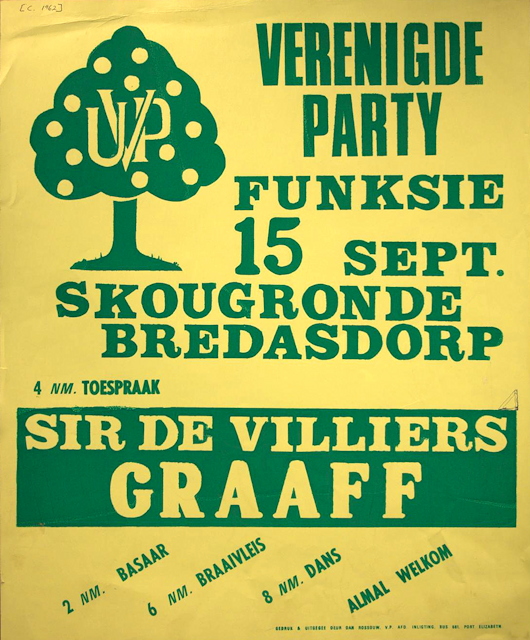
Alongside a bazaar, a braai, and dancing, a speech by Sir De Villiers Graaff is the selling point of this poster advertising a United Party (Verenigde Party) get-together in the beautiful Overberg region of the Cape.
“Sir Div” was the inheritor of one of only twelve South African baronetcies and led his party from 1956 until 1977 when it merged with the Democratic Party of verligte ex-Nationalists to form a new entity.
The broadly centrist party had lost power to the republican Nats (creators of apartheid) in 1948, and suffered splits that led to the creation of the Liberal Party and the United Federal Party in 1953, the National Conservative Party in 1954, and the Progressive Party in 1959.
The party’s emblem was a happy little citrus tree.
A Land, not a Republic
Bohemians seek to rename Czech Republic as ‘Czechia’
What are we to make of the growing movement against the name ‘Czech Republic’? It seems a welcome development, although one has a certain hesitancy in adopting the name ‘Czechia’ which somehow just doesn’t ring true from the English tongue.
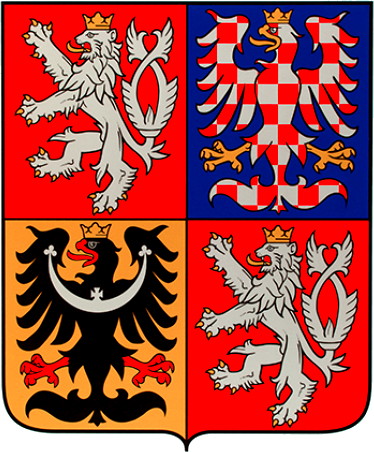 Many will still automatically recall ‘Czechoslovakia’, an artificial country invented in 1918 which lasted a surprising seventy-four years. Its two successor states will celebrate their twenty-fifth anniversary of independence next year, and perhaps this landmark event has provoked some introspection regarding the country’s name.
Many will still automatically recall ‘Czechoslovakia’, an artificial country invented in 1918 which lasted a surprising seventy-four years. Its two successor states will celebrate their twenty-fifth anniversary of independence next year, and perhaps this landmark event has provoked some introspection regarding the country’s name.
It’s not that the Czech Republic is alone: there are plenty of countries whose official names included an adjectival demonym — the French Republic, the Italian Republic, and the Hellenic Republic spring to mind. But these three examples all have names that more readily spring to mind — France, Italy, Greece — and which are used more frequently then the official state names.
Besides the Czech Republic, the only other example of a country known only as ‘the [demonymic adjective] Republic’ is the Dominican Republic, which cannot be known as Dominica owing the nearby sovereign island of the same name. (The island Dominica was named after Sunday whereas the DR was named after Saint Dominic, the patron of its largest city.) Even the Central African Republic is often referred to as Centrafrique (in French, at least).
Is it a move against republicanism? Not especially. When neighbouring Hungary adopted its new constitution it dropped the state name ‘Hungarian Republic / Republic of Hungary’ in favour of just plain ‘Hungary’ while maintaining a republican form of government. More influential perhaps is that it’s often viewed as a bit tinpot-dictatorship to have the word ‘republic’ in your country’s everyday name. (more…)
Nick and Miriam
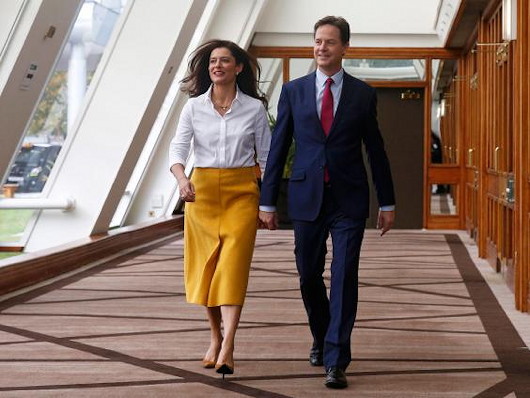
The Lib Dems are justifiably an unpopular lot, but their obvious defects aside one can find time to love a bare few of their number.
Sir Ming — sorry, Lord Campbell of Pittenweem now — will always be my favourite Liberal leader: captain of the Scotland team at the 1966 British Empire & Commonwealth Games, Chancellor of the University of St Andrews, as well as my MP when I lived in the Kingdom of Fife.
The prize for favourite unsuccessful Liberal candidate goes to my former tutor, the arch-monarchist Rt Rev Dr Ian C Bradley, who contested Sevenoaks for the Liberals at the February 1974 general elections. (Incidentally, the seat was later contested by Tim Stanley for the Labourites in 2005.)
But I also have to confess I’ve always rather liked Nick Clegg. While the overwhelming majority of politicians are mediocre, he enjoys the élan of a continental mediocrity rather than a more English strain. In fact, Nick Clegg’s incredibly boring and voter-friendly English name disguises a polychromatic background. On his father’s side he is descended from the Engelhardts (a Russian noble family of Baltic-German ancestry) and is indeed a distant cousin of Count Michael Ignatieff, leader 2009-2011 of Canada’s Liberal Party, while his mother is a Hollander of the Dutch East Indies. No surprise then that Clegg claims fluency in French, Dutch, German, and Spanish. What a waste he was as DPM: he would’ve made a decent Foreign Secretary.
I suppose as an inveterate cosmopolitan myself I must subconsciously find some strange affinity with this ex-leader of the Lib Dems. But chatting with my friend Roland the other day we decided that really the best thing about Clegg is not the man himself but his spectacular wife.
Being stylish, beautiful, Spanish, and Catholic, Miriam González Durántez manages to combine many wonderful and desirable qualities. She is also very obviously in charge. “Oh, Nicky darling, you are agnostic? How cute. The children are being raised Catholic.” And she looks great in Liberal yellow — not a colour every woman can pull off.
If the Lib Dems are looking to increase their vote-share and return to former prominence they could do worse than making Miriam leader. But then — with the exception of Leeds North West with its Chestertonian pro-life real-ale-and-trams-obsessed Lib Dem MP — this is a party unlikely to ever capture the Cusackian vote.
The End of Liberalism
Viktor Orban on the end of the liberal age and the threat to Europe
In a speech to supporters at the Fidesz party’s fourteenth annual Kötcse picnic, the Hungarian prime minister Viktor Orbán has claimed that the refugee crisis is a portent of the end of “the era of liberal babble”. The current “identity crisis” of liberalism, Orbán argued, presented both “huge risk” and “a new opportunity” to return to Christian and communal identities.
Mr Orbán said that the dominant liberal ideology had weakened Europe while preserving its wealth. “The most dangerous combination known in history is to be both rich and weak,” he argued. “It is only a matter of time before someone comes along, notices your weakness, and takes what you have.”
“The liberal philosophy is a result of a Europe which is weak and which also wants to protect its wealth; but if Europe is weak, it cannot protect this wealth.”
Mr Orbán also attacked the liberal imperialism of military intervention, asserting it has been based on fundamental hypocrisy and simplistic Manichean thinking: (more…)
Putin: ‘I’d really like to see Europe show some real independence and sovereignty’
‘Europe is facing a specific problem: an influx of immigrants’ the Russian president asserts in an interview for Swiss television
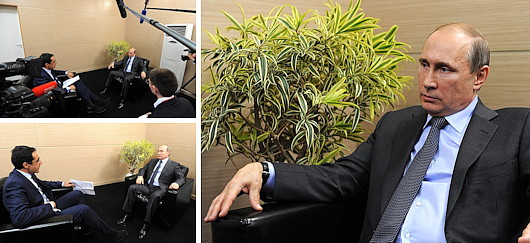
Here are a few excerpts from the interview, dealing with (among other issues) the balance of power, independence and sovereignty in Europe, and relations with the United States.
Vladimir Putin: Bonsoir.
Vladimir Putin: This is done by dishonest and inattentive people. The process of starting a new arms race began from the moment of the United States’ unilateral withdrawal from the ballistic missile defence treaty. Because this agreement was a cornerstone for the entire international security system. And when the United States withdrew from it and began to create a missile defence system as part of its global strategic weapons system, we immediately said: we will be obliged to take reciprocal steps to maintain a strategic balance of power.
I want to say something very important: we are doing this for ourselves, to ensure the security of the Russian Federation, but we are also doing it for the rest of the world, because this strategic stability ensures the balance of power.
Vladimir Putin: My mother and father. My brother, whom I never met, died here during the seige.
Vladimir Putin: I hope not. But I would really like to see Europe demonstrate some real independence and sovereignty and be capable of defending its national interests, the interests of its people and its nations. […]
Vladimir Putin: […] Participation in any military and political organisation or bloc is associated with the voluntary renunciation of a certain share of one’s sovereignty.
I think that at the time, France withdrew from NATO to preserve its sovereignty more than it is possible within the framework of a military bloc. It is not our business to analyse European nations’ foreign policy. But I think you’ll agree that if we need to discuss intra-European affairs with European partners in Washington, it is not very interesting.
Vladimir Putin: I think that this is not so much support for me as the realisation of national interests as the political parties see them.
There are certain tectonic changes underway throughout the world and in Europe within the public consciousness, which are aimed at defending national interests. You must understand that right now, Europe is facing a specific problem, an influx of immigrants. And did Europe make the decision that ultimately led to this situation? We need to be sincere and honest: these decisions were made across the ocean, but Europe must deal with the problem.
Vladimir Putin: Of course. This is just one example, but there are many. But this does not mean – and I already said this – that we should somehow demonise US policy; that is not my goal. They are conducting their policy as they see necessary in their interests.
We must strive to find a balance of interests; we need to invigorate our work, give new momentum to the work by the UN Security Council. The US is certainly a great power and the American people created this nation over several centuries, it is simply an amazing result. But that does not mean that today’s US authorities have the right to travel throughout the world and grab anyone to drag back to their prison or act from a position of “anyone who is not with us is against us.”
We need to be patient and work with our American colleagues to find solutions, the way we have in some areas of our cooperation, such as with the Iranian nuclear issue.
[…]
Vladimir Putin: After our interview, do you think I am mad?
Vladimir Putin: This is part of political struggle; it has been part of my life for quite a number of years. I try not to pay too much attention to it. I simply do what I think is necessary in the interests of my country and my people.
It is not in Russia’s interests to be in confrontation with other countries, but sometimes we are forced to protect our interests, and we will undoubtedly continue to do so. However, we will seek solution not in confrontation, particularly military confrontation, but in finding compromise and mutually acceptable solutions.
With your help I would like to address not those who criticise me, but those who support me. I would like to thank them for their support and tell them that we will continue moving ahead together. Above all, I am referring not to those who portray me [as Stalin], but to those who sympathise with what we are doing and agree with it deep inside.
Merci beaucoup.
Evolution of a Napoleonic Parliament
The Salle des états in the Palais du Louvre
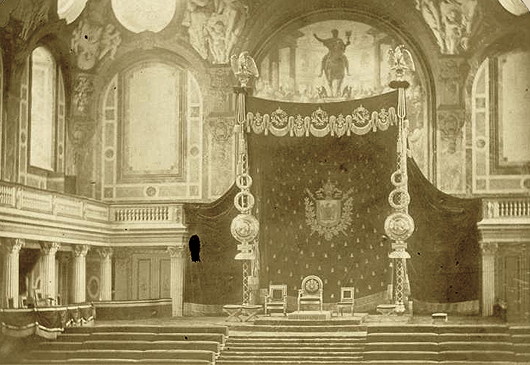
Among the numerous rituals of the ordinary visitor’s pilgrimage to Paris — trip up the Eiffel Tower, lunch at a tourist-trap café — braving the teeming hordes in the Louvre to view da Vinci’s ‘Mona Lisa’ ranks near the top. What very few of the camera-toting hordes realise is that they are shuffling through the room that once housed France’s parliament. The history of the Palais du Louvre is long, exceptional, and varied.
Originally built as a stern castle in the 1190s, the Louvre’s secure reputation led Louis IX to house the royal treasury there from the mid-thirteenth century. Charles V enlarged it in the fifteenth century to become a royal residence, while François Ier brought the grandeur of the Renaissance to the Louvre — as well as acquiring ‘La Gioconda’. In 1793, amidst the revolutionary tumult, part of the palace was opened to the public as the Musée du Louvre, but the Louvre has always housed a variety of institutions — the Ministry of Finance didn’t move out until 1983.
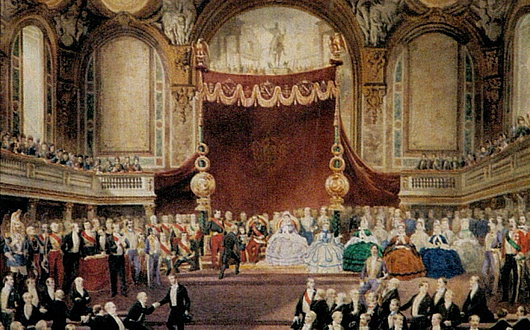
Napoleon III took as his official residence the Tuileries Palace which the Louvre was slowly enlarged towards over the centuries to incorporate. The Emperor needed a parliament chamber close at hand so he could easily address joint sittings of the Senate and the Corps législatif (as the lower house was called during the Second Empire) which opened the parliamentary year. By doing so at his residence, the Bonaparte emperor was following the example left by his kingly Bourbon predecessor Louis XVIII. (more…)
The Swiss model
Harold James advocates scaling up small country democracy, if the members of the European Union are ever to succeed in settling upon a working model of democracy. He explains why the Swiss model of “Konkordanzdemokratie” has much to offer.
From Schweizer Monat via Eurozine.
SWISS PEOPLE TEND to regard their political, social and economic order as something quite unique, that cannot be replicated elsewhere. That is a pity. Switzerland would not only do other countries a terrific favour by exporting its political and social order; it would also help make its own existence more viable, in the midst of an environment that has become quite threatening. Exporting Swissness would be an act of self-interest and not just altruism.
The members of the European Union are in desperate need of a working model of federalism and of democracy. Are there any useful or instructive foreign models for modern Europe in its hour of need? The history of the United States has some appeal. Many Europeans now regularly cite Alexander Hamilton’s famous negotiation in 1790 of the assumption of state debts by the federal government as a model for how a United States of Europe might be created. But the actual turn of events is less than appealing. The individual states embarked on a borrowing binge in the late 1830s, that was then followed by widespread default in the early 1840s. The revenue stream that was used to service the federal debt – the external tariff – represented a necessary part of the Hamilton scheme that was also inherently and intensely conflictual, and proved to be a cause of increased tension between the American North and the South.
Situated in the heart of Europe, the Swiss experience might offer a superior example for modern Europeans. (more…)
Search
Instagram: @andcusack
Click here for my Instagram photos.Most Recent Posts
- Burns Tower April 19, 2024
- Patrick in Parliament March 18, 2024
- Articles of Note: 13 March 2024 March 13, 2024
- Cambridge March 9, 2024
- Taken on Trust March 4, 2024
Most Recent Comments
Book Wishlist
Monthly Archives
Categories


